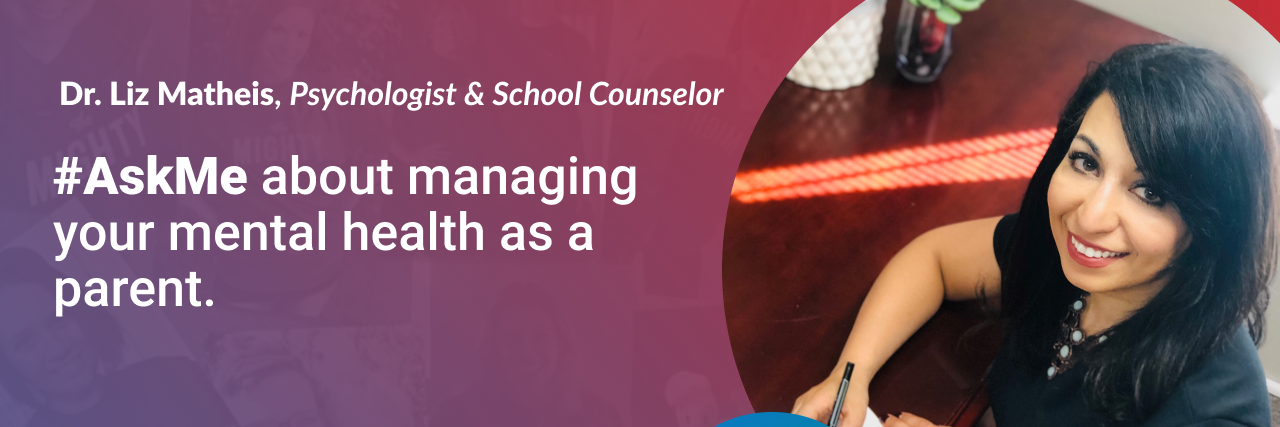How to Care for Your Mental Health While Caring For Your Child's Needs
Dr. Liz Matheis talks to The Mighty community about managing your mental health as a parent.
Dr. Liz Matheis is hosting #AskMe from August 26-30 on The Mighty! Ask your questions here!
“My child’s needs won’t go away. What can I realistically do to work on my own mental health?”
When we became parents, our children became the center of our universe. Our own self-care became secondary. This is especially true when we have a child with disabilities. Our child’s needs become primary, but one thing I know is that by not taking care of yourself, you will not be able to take care of your child.
How many times have you thought, “I should read/sing/talk to my child because it’s good for her,” even when you really don’t want to?
You may be experiencing some burnout. That is, you feel like you are tired — tired of thinking about what’s next, what if, what will I do when… and you’re managing all of these thoughts while trying to hold on to the guise of being a woman or a man, a wife or a husband, a daughter or a son, a brother or a sister and a friend. If your head is spinning, I understand. I hear you and I feel you.
I know when I get to the point where my head is going to explode with the constant running lists, when I’m checking those lists on my phone and I’m adding more “things,” I know I am good to nobody. Not my kids, not my husband, not my patients; no one, nowhere.
I know it’s really hard, and I combat the feelings of guilt of wanting to run away and hide in a corner for a few hours right along with you. I crave silence in my head, even when the room is quiet. I crave not having my name called for the 523.67th time in the past hour. I want to owe nothing to no one.
That’s burnout.
That’s just plain old burnout in its truest form.
When I get here, I know something has to give. I know I have to change my mindset and my routine in order to survive.
Shifting your mindset
I have always felt the strong urge to “do the right thing” by everyone in my life, but especially with my children. I want to make sure that I am providing them with every opportunity for them to be happy and achieve their potential. I strive to keep my home clean, prepare a health dinner, have healthy snacks in my pantry, and to provide experiences that are educational and enjoyable.
Big goals that serve as big a pressure, and that are also highly unrealistic.
It has taken two years in therapy for me to come to terms with the idea that I cannot give 100 percent in every direction of my life because at the end of the day, I only have 100 percent to give, not 10,000 percent.
I am embracing the idea that I can still be a “good” parent to my children while not checking each one of the items from my mental checklist I just mentioned. On some days, it’s OK if their primary form of entertainment is the TV, their phone or iPad. It’s OK if I order in or we eat a bunch of frozen meals that have been sitting in the freezer for… I don’t know how long! It’s OK. It’s really OK. Your children and my children will not suffer.
Sometimes, it’s OK to be good enough. Give up the guilt and, in the wise words of Elsa from the movie “Frozen,” let it go!
Makes sense? What are some other ways you can shift your mindset?
Building down time into your daily schedule
This is a tough one, so I suspect what you may be thinking. I encourage you, and even push you to consider giving yourself a minimum of 30 minutes each day to decompress. Go into a room in your house and close the door or leave the house entirely. Read a book. Watch a show. Whatever makes you feel rested, fills your emotional cup and gives you stamina. What works for me is taking a nap.
For many the car ride home from work or is restful and decompressing, I don’t find driving gives me that down time. I need to be devoid of stimulation for a short period of time so that my brain can rest and “get rid of the noise.”
Ask yourself, what can I do to take care of my body and my heart? That is always a good place to start.
Do you have questions for Dr. Liz Matheis? She will be answering your questions about managing your mental health as a parent August 26-30. Join the conversation!

